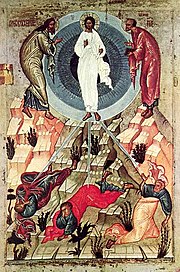Luisa Piccarreta
The neutrality of this article is disputed. (September 2016) |
Some of this article's listed sources may not be reliable. (September 2016) |
| Part of a series on |
| Christian mysticism |
|---|
 |
Luisa Piccarreta, (23 April 1865–4 March 1947) also known as the "Little Daughter of the Divine Will", was a Catholic mystic and author whose spirituality centred on union with the Will of God.
For some time, her confessor was Saint Annibale Maria di Francia. Piccarreta is currently under investigation for possible canonization as a saint of the Church.
Biography[]
Luisa Piccarreta was born in the comune of Corato in the former Province of Bari, southern Italy, on 23 April 1865 to Vito Nicola and Rosa Tarantino Piccarreta. She received only a first grade education, and as a teenager she joined the Third Order of Saint Dominic.[1] As an adult, she took up lacemaking.
By 1889, she became bedridden, and in February of that year, her spiritual director asked her to begin a diary of her spiritual experiences. She did this until 1938, with her writings running to thirty-six volumes. In 1926, Annibale Maria di Francia was in Trani to open branches of his newly established institutes; he asked her to write her autobiography. Piccarreta died of pneumonia on 4 March 1947, at the age of 82.[1]
Cause for canonization[]
In 1994, the Archbishop of Trani-Barletta-Bisceglie opened her cause for beatification.[1] By October 2005, the diocesan-level process of inquiry and documentation within the Diocese of Trani-Barletta-Bisceglie-Nazareth was completed. Her case was then passed on to the Congregation for the Causes of Saints at the Holy See, and she was titled "Servant of God".
Writings[]
In 2007, the investigation turned to examining Piccarreta's writings, "...to clarify difficulties of a theological nature."[2] This review was somewhat complicated by the fact that she wrote her works in the Barese dialect of Neapolitan.[3] In a letter dated 1 November 2012, Archbishop Giovan Battista Pichierri pointed out that until such time as the review was finished, it would have been premature to render any opinion as to whether or not Piccarreta's writings conformed to Catholic teaching. Archbishop Pichierri also stated that a "typical and critical edition" of her writings will then be issued. He further specified that the Archdiocese is the legal owner of her writings, and no other translations have been authorized.[2]
On 1 November 2012, Archbishop Pichierri reiterated what he had earlier observed in 2006, "that the doctrine of the Divine Will has not always been presented in a respectful and correct manner, according to the Doctrine of the Church and the Magisterium, placing on the lips of Luisa claims that not even implicitly are found in her writings. This causes trauma in the consciousness and even confusion and rejection in people and among the priests and bishops." (Letter of 09 March 2006).[2]
"...the initiatives that are taken in reference to the spirituality of Luisa, such as conferences, days of spirituality, prayer meetings, etc., To give peace of mind to those who participate, must be authorized by their Bishop." (Letter dated 24 November 2003).[2]
References[]
External links[]
(Feb.18.2021: this site is not available, has been expired)
- "Introduction to Luisa Piccarreta: The Book of Heaven, The Divine Will, St Hannibal Di Francia, Hours of the Passion, The Virgin Mary in the Kingdom of the Divine Will". Archived from the original on 2013-04-23.
- "Luisa Piccarreta and the Divine Will" (in English, Spanish, and Italian). Archived from the original on 2016-06-02. Retrieved 2018-07-06.
- "Monthly Prayers Calendar and Other Writings". luisapiccarreta.co (in English, Spanish, and Italian). Retrieved 7 July 2018.
- "Pia Associazione "Luisa Piccarreta"" (in English and Italian). Archived from the original on 2005-04-20. Retrieved 2008-08-11..
- 1865 births
- 1947 deaths
- 19th-century Italian women writers
- 20th-century Italian women writers
- 20th-century venerated Christians
- Italian religious writers
- Italian Servants of God
- Roman Catholic mystics
- People from the Province of Bari
- Women religious writers